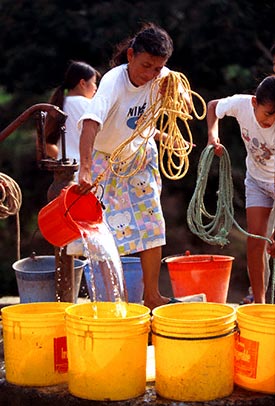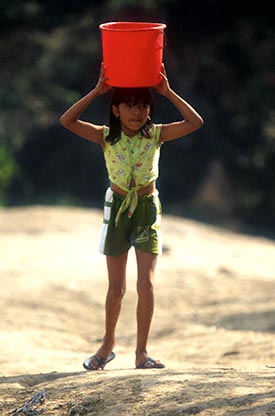
The Montecristi Foundation, Inc.: A non-profit, private operating foundation.
Our mission is to preserve, and to re-grow, the centuries-old art of hand-weaving the legendary Montecristi “Panama” hats.
Salud. Comida. Arte. Health. Food. Art.
“To save the art, first we must save the artists.”
We are but a match in a hurricane. We do a little bit in a little village. We make a few lives a little better, once in a while. It’s not much, but it’s something. Perhaps, after seeing what we are doing now, you will decide to help us do a little more.
Funding for Foundation projects and programs has come from The Panama Hat Co. of the Pacific, Inc. and from sales of Montecristi hats of $5000 and up. Profits from those hat sales were repatriated back to the weaving community in the form of free medical care and other programs of the Foundation. Currently, the Foundation also receives direct donations from people like you (hint, hint).
Specific programs funded and administered by The Montecristi Foundation, Inc.:
Weaving School top
Jan 15, 2012 Established in January of 2011, the Montecristi hat weaving school in the village of Pile (pee-lay) is celebrating its one-year anniversary. A major milestone. Pile is the village where the very finest Montecristi hats have been woven for . . . oh, a couple of hundred years.
Please join me in a ¡WOOHOO! moment. A moment, not of silence, but of celebration. By golly, we won one for the Gipper.
Five students completed the full year of instruction, and very hands-on practice.
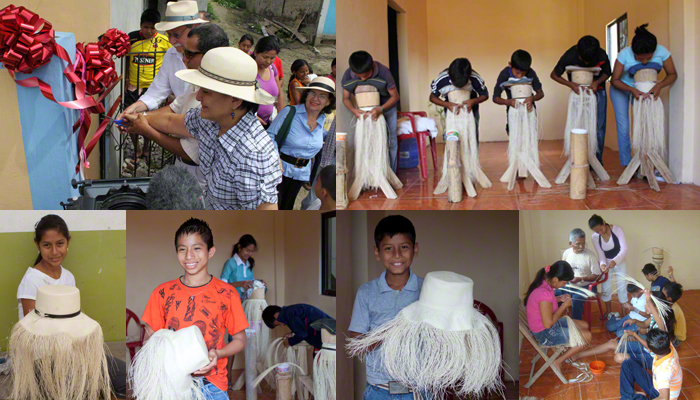
All students completed at least one hat. Three students completed two hats each. All of the students definitely show promise. Two are seriously good.
Tuition is free. Straw is free. Class size is limited. The school has a primary teacher plus an assistant teacher. The Montecristi Foundation pays salaries, rent, and all school-related cost, including a free meal for the students, which they eat during their break. (Hmm, should I ask for donations here, or not? Better not. People get tired of charities begging all the time.)
Weaving classes are three hours per day, five days per week. Weaving school hours do not interfere with regular school. Students may keep their completed hats, sell them to any buyer they choose, turn them over to their families, use them for easter baskets, do whatever they want. They have no obligation to the school, the foundation, or me.
I do offer to buy student hats at above-market prices, the same as I would offer to any other weaver for a comparable hat. If they can get a higher price from another buyer, then I am a happy guy who figures the weaving school is succeeding.
The five current students all wish to continue. There are also many kids in the village, including some teenagers, who want to attend the school. Some already know the basics of hat weaving, but want to improve their skills. Wow. A best-case scenario.
I will be in Montecristi and Pile in a few weeks. I will meet with the teacher and assistant teacher to discuss what we need to do to accommodate more students without compromising the quality of the teaching and the quantity of personal instruction each student will receive.
The goal is to keep the art alive. To teach the next generation to make the magic of their fathers and mothers, the magic of their great-great-grandfathers and great-great-grandmothers, the magic of their nation's most famous creations, the magic that elevates simple straw to fine art.
Of course, the real trick is to make sure the weavers can turn their straw into gold.
That means you need to go buy a hat. I promise to keep doing my part.
Medical Care top
When we first began to provide free medical care to the village of Pile back before the turn of the century, ours was the only medical care available in the village. The government of Ecuador had not yet “discovered” Pile. We started with a couple of experimental medical days, funded by The Panama Hat Co. of the Pacific, Inc.
A physician from Montecristi city brought two assistants and his best guess as to what medications might be needed. They gave physical examinations, listened to complaints and symptoms, prescribed medications when appropriate, and advised patients on basic health maintenance, diet, etc. (mostly ignored, same as I do).
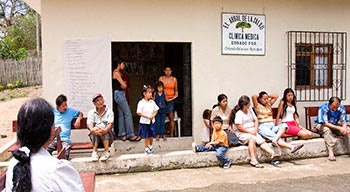
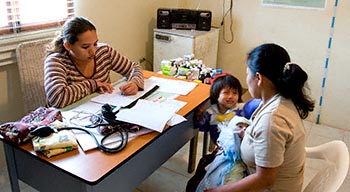
These free medical days were so popular with the weavers and their families (not a surprise) that we continued the program. We funded free medical days in Pile several times per year, as many as we could afford.
The Foundation was created, incorporated, and approved by the IRS during this period.
We have provided several “doctor days” each year for Pile, from our inauspicious beginnings nearly a decade ago up through 2007.
We will continue to do our best to provide medical help for the village of Pile. The government of Ecuador has finally discovered the village, and assigns a physician just out of school to provide care for Pile on a regular schedule. So we modified our own program to provide the most help possible within our small budget.
We now provide free eye exams and eyeglasses, safety gear to prevent health problems and occasional extraordinary help in emergency situations.
Safety Masks for Weavers top
The Montecristi Foundation, Inc. ( MCF ) has provided free safety masks to the weavers of Pile. This is the first time in history that the weavers have had any way to protect themselves from the potentially hazardous sulfur fumes that are an essential part of the process.
Sulfur powder is critically important to the traditional process of creating genuine Montecristi hats. We routinely provide free sulfur powder to the weavers of Pile. I bought a safety mask for Gabriel to wear while dispensing sulfur in Pile. He also wears it when he uses burning sulfur to bleach and fumigate the hats he is preparing for export to me. He and I agreed that the weavers also needed safety masks to protect their lungs from the caustic sulfur fumes when they are bleaching their straw and their hats.
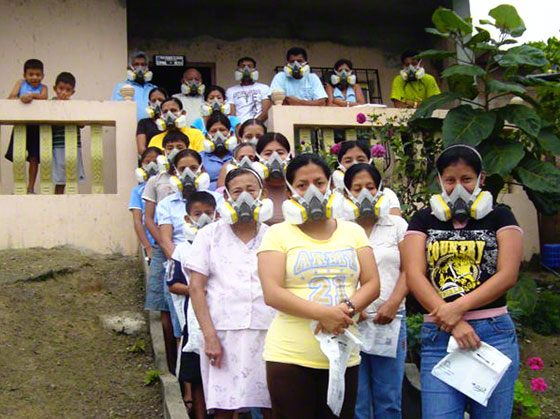
As the foundation continues to receive contributions from donors like you, we will expand the program to buy safety masks for the weavers of El Aromo and Las Pampas. A $50 contribution buys a new safety mask.
EyeGlasses
The Foundation brought an optometrist to Pile, provided free eye exams, and free eyeglasses. I was there when the optometrist came, and I was shocked to discover that most of the weavers literally couldn’t see what they were doing. I had high hopes that a dramatic increase in fineness and evenness of weave would follow immediately. I was wrong. Touch and feel must be more important than sight when weaving. (See related story about a child’s eye glasses).
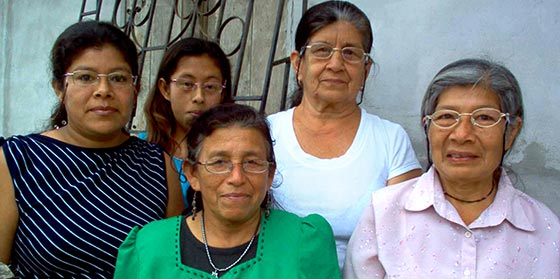
More Free Eyeglasses
Eyes change. New glasses were needed. So, in July 2011, The Montecristi Foundation again funded an optometrist to go to Pile. This time, with more sophisticated equipment than anyone has ever seen in Pile, including those with perfect eyesight.
Eyes were examined. Prescriptions were written. Eyeglasses were made and distributed. All free. The service was offered to all the weavers, not only to those whose hats I buy.
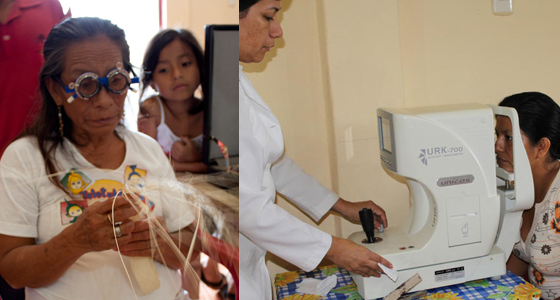
Water Project
Ugly beauty. Ugly to look at, but beautiful to have in your neighborhood if you live in Pile, Ecuador, the tiny village where the very finest Montecristi hats have been woven by hand for generations.
It is a water storage tank to provide a safe water supply for the village. The old water storage tank was, well, old. There were serious problems with it, including health issues. It needed to be replaced.
Steve Singer, CEO of Hartford York, joined with The Montecristi Foundation to fund the Pile Water Project of 2008. Steve and I agreed to donate funds to buy the materials, and the people of Pile agreed to provide the labor. Perfect. We'll help you, if you'll help yourselves.
We hired an architect to select the best site, to make a drawing of the proposed system, and to provide a cost estimate. He did his part, we bought and delivered the materials, and the people of Pile build the storage tank.
The project is a total success. Still providing water to the village of Pile, as I write this in 2012. Yes, sometimes I am very slow to report wonderful things. It seems to me to be more important to spend time trying to do things to help than trying to report them. (An odd point of view for a newspaper editor’s son, and one who enjoyed a 30-year advertising career.)
Water is life.
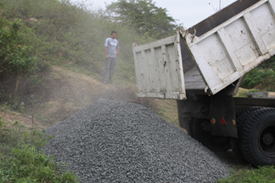
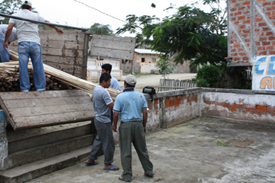
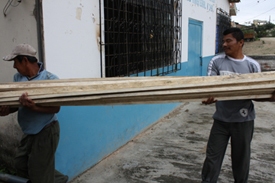
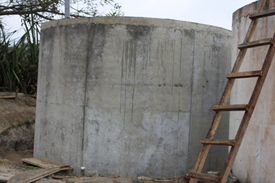
Simón supervises unloading gravel, Simón helps unload lumber
Simón carrying lumber, Completed water tank
Denomination of Origin protection for “Montecristi” Hats
This is one of our most important projects ever. We are working, successfully, to give legal protection to “Montecristi” hats in the same way “Bordeaux” and “Champagne” wines, “Idaho” potatoes, “Jamaica Blue Mountain” coffee, and other regional produce and products are protected. The MCF and The Panama Hat Company of the Pacific, Inc. have funded, for several years, legal action in Ecuador, to win Denomination of Origin protection for Montecristi hats.
The World Intellectual Property Organization (WIPO) of the UN oversees, globally, Denomination of Origin applications. When we made our application, WIPO sent an inspector to Montecristi to evaluate the merits of the application on behalf of “Montecristi” hats. The UN inspector from WIPO endorsed our application for DO protection, meaning that he endorsed our assertion that both process and product of “Montecristi” hats are unique and proprietary to the area.
Once our application was blessed by WIPO, IEPI, a governmental agency of Ecuador that regulates and protects intellectual property rights, conducted two similar inspections to verify the unique process employed to cut, prepare and weave the straw to create Montecristi hats. In 2007, IEPI passed a resolution awarding Denomination of Origin to “Montecristi” hats.
Unfortunately, the official DO resolution had no teeth in it — no certification system, no enforcement. So, four and a half years later, there is absolutely no change in the market place.
I have continued my own efforts to create and implement an effective certification system for genuine Montecristi hats. IEPI has suddenly awakened. They are holding meetings and have announced that the first Montecristi hats will be officially certified in January of 2012. My business manager in Montecristi, Andrea Santos, has attended the meetings, and I have been invited to partipate as an expert adviser.
Fair Trade
It seems like a great idea, doesn’t it? No forced labor. No sweatshops. Pay workers fairly. Make sure their working conditions and hours are reasonable. All good. Sign me up.
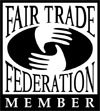
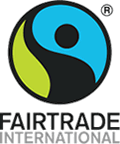
Paying the weavers and artisans more fairly than they’ve been paid for the past hundred years has been central to my efforts to save the art of fine hat weaving. Simple concept: if you want people to do something, pay them well enough that they will want to do it too.
I’ve also been actively trying to protect weavers’ health by providing safety masks to protect eyes and lungs, by bringing physicians and optometrists to the village, by paying for and delivering prescription medicines, by building a water project, and a few times I've even paid for surgery and prenatal care that weavers’ family members desperately needed but could not afford.
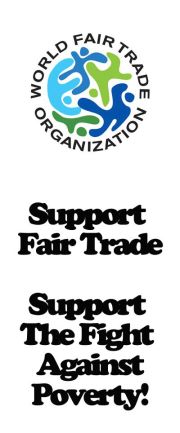
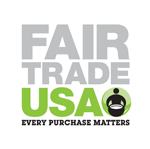
So I thought it was logical to become a Fair Trade merchant. Naturally, I Googled “fair trade organizations.” I discovered that there are quite a lot of them. Some operate only in certain parts of the world. Some specialize in a particular type of labor or product. Some actively inspect work sites and working conditions. Some help set labor prices. Some look like maybe they don't do much but sit in their offices and collect application fees.
I was still trying to figure it all out when I heard (on NPR) the news story about Victoria’s Secret and a Fair Trade scandal. The report was that farms, where cotton is grown for Victoria’s Secret products, were exploiting children. Certainly not the fault of Victoria’s Secret. They want to do the right thing and relied on the Fair Trade group of which they are/were members to implement and maintain the standards they claimed. But that particular Fair Trade group was not doing a good job, and workers, including children, were being exploited. So who watches the watchers?
Forget it. “Join Fair Trade Group” was scratched off the to-do list. I’ll just keep doing what I’ve been doing for many years: raising prices paid to weavers and artisans, protecting individual and public health as best I can and can afford. Fair enough?
Fighting Montecristo Cigars
”Montecristo” is one of the largest and most famous Cuban cigar brands. The company, based in Havana and Madrid, filed in Ecuador for trademark registration of “Montecristo” as a brand name for hats. If they succeed in winning trademark registration, in Ecuador, for “Montecristo” hats, then it seemed inevitable that the company will soon take legal action to prevent anyone from using “Montecristi” to describe hats.
They would claim that the name Montecristi is too similar to their registered trademark of Montecristo, that it would cause confusion in the market, and would damage sales of their brand. Therefore, they would claim, Montecristi should no longer be used to describe hats because it infringes on their trademark. Surely, a large multi-national corporation would never do such a thing, would never take legal action to prevent producers of Montecristi hats from properly calling their hats Montecristi hats. Would they? They say they wouldn’t. I preferred not to take a chance.
The MCF and The Panama Hat Company of the Pacific, Inc. funded legal action to block “Montecristo” as a registered trademark for hats in Ecuador. We won the initial ruling, they appealed, we won again, they appealed again, and so on. The cigar company finally agreed to withdraw “headwear” as part of their trademark application. Great. It’s settled then, right? In my dreams. For reasons beyond my understanding, the legal “battle” continued even though both parties had reached agreement. Sigh.
The legal dance continued for a while longer but it has finally been resolved for once and for all (I hope). We have successfully protected “Montecristi” hats from “Montecristo” hats.
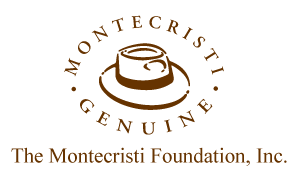
Thank you for reading about the programs, activities, and intentions of The Montecristi Foundation, Inc. We are sincerely trying to do the best we know how, and can pay for, to support the art and the artists of Montecristi. We welcome your input and we’re grateful for your help.
Text and photos © 1988-2026, B. Brent Black. All rights reserved.
100% Secure Shopping







